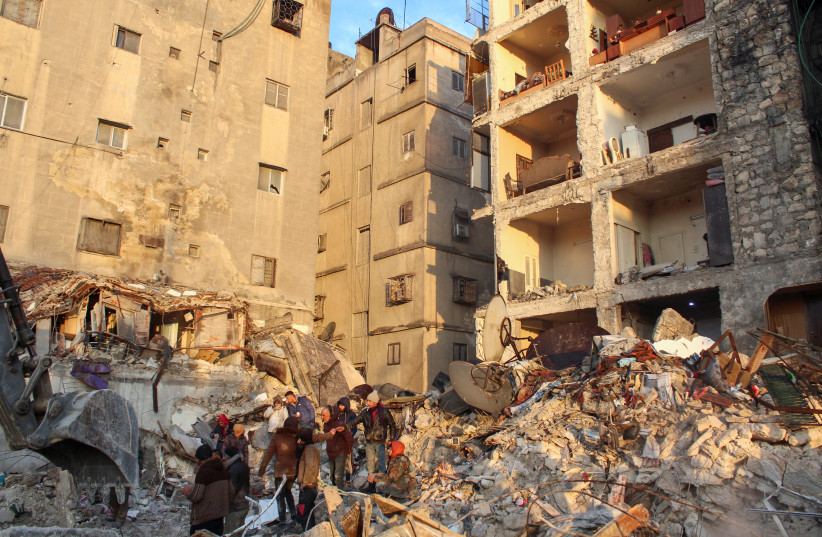A popular graphic on social media shows Turkish airspace full of planes while there is hardly a single plane in Syrian airspace. This image reflects what largely has been happening to the victims of the most recent devastating earthquake that hit both countries.
For more stories from The Media Line go to themedialine.org
Turkey, a NATO member with a strong economy, cannot be compared with Syria, which has been embroiled in a deadly civil war that has kept the Bashar Assad regime in power. It is true that the Syrian regime has stayed in power due to outside forces, but the fact is that sanctions policies – most important the US-sponsored Caesar Act – have had a devasting effect on the people and not the regime.
The Caesar Syria Civilian Protection Act, also known as the Caesar Act, is a US federal law that was signed into law in December 2019 by former US President Donald Trump. The Caesar Act imposes economic sanctions on the government of Syria and its supporters, including individuals and entities, who are found to be involved in human rights abuses or undermining the political process in Syria.
The law is unsuccessful
The act is named after the code name of a former Syrian military photographer who defected from the Syrian Army and leaked thousands of photographs documenting widespread human rights abuses and atrocities committed by the Syrian government. The Caesar Act is aimed at holding the Syrian government and its supporters accountable for the widespread human rights abuses and violations of international law that have been documented in the country over the past decade.
But despite the correct intentions of those behind that law, it has failed to produce any change. Assad is still in power, albeit bolstered by Iran and Russia, but the Syrian people have suffered tremendously because of these sanctions.

In a normal situation, the people who endure most of such sanctions revolt against their own government, which is what brought such punishment on them. But this will not work with Syria, which is hardly a democratic country that pays attention to the wishes of its own people. A regime that has persecuted and even killed its own protesting citizens certainly will not budge if the people protest the economic disaster caused by the US-sponsored sanctions.
Sanctions against undemocratic regimes can often hurt the general population more than the regime itself. This is because sanctions typically target the economy, which can lead to a reduction in the availability of basic goods and services, and cause inflation and currency depreciation. This, in turn, affects the purchasing power of ordinary citizens, making it harder for them to access essential items like food, medicine and fuel.
Additionally, sanctions can disrupt trade and investment, which can result in job losses and further harm the economy, making it even more difficult for people to make ends meet.
Furthermore, undemocratic regimes often have control over the distribution of resources, so they can use the impact of sanctions to further consolidate power and tighten their grip on the population. In some cases, the regime may use the sanctions as an excuse to crack down on political opposition, restrict access to information and limit freedom of expression. Therefore, while sanctions may be intended to put pressure on the regime and bring about change, they can have unintended consequences and end up hurting the very people they are meant to protect.
UN sounded alarm before the earthquake
The level of human suffering has led the United Nations to sound the alarm about the situation in Syria, even before the current earthquake caused such widespread carnage.
The executive director of the World Food Program, David Beasley, said on January 27 that if we do not address this humanitarian crisis, “things are going to get worse than we can possibly imagine.”
Following 12 years of brutal conflict, an economy crippled by runaway inflation, a currency that has collapsed to a record low, and soaring food prices, 12 million people in Syria do not know where their next meal is coming from, according to the World Food Program.
A further 2.9 million people are at risk of sliding into hunger, which means 70% of the population may soon be unable to put food on the table for their families.
Already the efforts to economically sanction Syria have failed to be ironclad on the part of other countries. Nearby and slightly friendly countries, including pro-US countries, have not honored these sanctions. This has been especially true in the past few days as the disaster that has hit the Syrian Arab Republic has caused many to step up and provide direct support to the people of Syria.
The time has come for the Biden administration to review its own policy regarding the Syrian government, whose regime is certainly not democratic, but in foreign policy that is hardly the only factor that must be taken into consideration.
